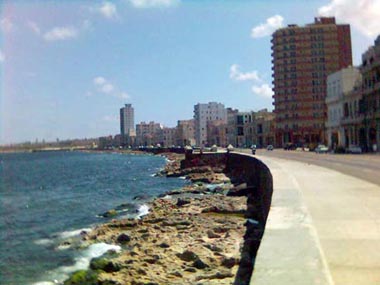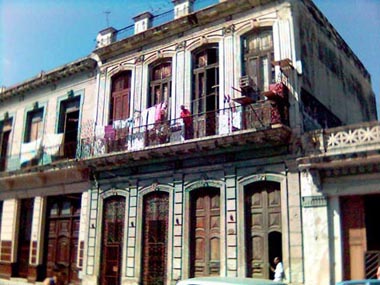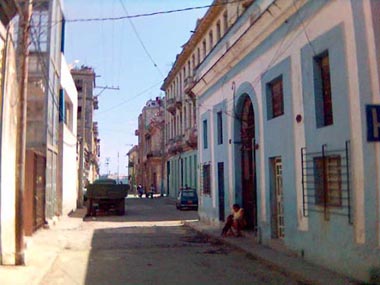Reflections on Cuba
I've been back in Mexico for nearly two weeks now after returning from Cuba, and I put to paper here some of my reflections on this remarkable other-world.
I should say we only had opportunity to visit Havana, so I can't report on Cuba in the holistic sense, but I had reactions to Havana alone sufficient to fill a book.
Included in this report are links to photographs and videos. You can skip to all my photos now at Flickr.com (though pictures don't tell the story that needs to be told), or see my videos at the end of this report.
A place of dreams
I guess many people have a dream to visit some place they hold as magical in their mind. Romantic notions of visiting a foreign land, or maybe influences from early childhood play a role in shaping those dreams. That was true to some extent for me in my desire to live and work in Latin America - though as a Christian I have moreover sought to see if this is rooted in a deeper calling from God.
What I didn't know until very recently is that Havana is a place I've always wanted to visit. Well how could that be? Perhaps it's because I never thought visiting Cuba a real possibility. The desire has floated in the land of make-believe not really making a connection with the land of real-possibilities.
However, when the proposition to visit Cuba was put to me in November last year, little sparks of magic wonder-stuff started firing in my brain, and I was inexplicably drawn to parting with nearly my whole holiday budget for the next year-and-a-half to experience just 4 days of Havana goodness. I don't know why. A gravitation in my teens towards the music of Gloria Estefan (of Cuban descent), a bewonderment of the iconic Che Guevara image, and more recently my passion for Salsa dancing suddenly fused together in all it's Latin American gooeyness to make this an opportunity not to be missed. Plus I was told the women are quite hot too.
First impressions
I knew I was entering a communist country. I knew Cuba has a controvertial history. I knew there was one world that the Cuban government wanted us to see, and another world that wants to be seen. I just hadn't given it that much thought.
Accompanying me to Cuba were two fellow Latin Link volunteeers working in Mexico - Graham Young and Joey Marris. As we were chauffeured from the airport to the centre of Havana, I was keen to spot the housing and everyday life of Cubans that we would pass along the way. Sure enough, as I looked out of the car window, we passed some pretty awful housing estates. High rise concrete buildings, crumbling and semi-derelict, but clearly still in use. The streets were eerily quiet, with just a few people walking about. The same could be said for the motorway we were travelling on, which seemed to have very few cars on it. For such an impoverished world, I was suprised to learn that the crime rate is very low. Admittedly it was a Sunday, but it all still seemed too quite somehow. That being said, there were no complaints from me. Having just come from a dirty, polluted, over-populated, and crime ridden city - to see palm trees, green fields and to breathe fresh air; to see a world of peace and placidity as we passed on by - sheer heaven.
Things began to bustle up as we approached the centre of Havana, and we began to take in with some awe the grandeur and majesty of this crumbling colonial city. What suprised us most though was to see our hotel. An agency in Mexico had arranged the holiday on our behalf, and we really knew very little about where we would be staying. What we were presented with though was a stay at the oldest hotel in Havana, the four-star Hotel Inglaterra. The "I'm not worthy" feeling began to creep to mind, followed shortly after by the realisation "Ahh, that's where all my money went".
After settling into the palace, and taking in the grand view from my balcony (photo, video), we took our first steps into this magical new world.
Entering a socialist world
As all three of us had come from Mexico where everything is very cheap; we had hoped Cuba would be the same. However Cuba uses two currencies - one for locals, and one for tourists. Because we were using the 'tourist' currency, shops and restaurants where we could spend the money charged prices more on a par with the UK than Mexico. Suddenly, not only did we feel massively cheated, but our shoe-string budgets were stretched to the limit.
Looking for our first lunch, we traipsed around the city until we found a restaurant with reasonable prices. We sat down in an Italian restaurant and began to ponder on this divide between Cubans and foreigners, and particularly on the socialist world in which the Cubans are trapped. I began to ask myself questions I have never needed to ask before in any other country.
How does a Cuban really know what an Italian restaurant is, when the country is so cut off from the outside world? Or how was it that I could be served branded Coke, when sanctions mean Coke can't do business with Cuba? My questions got broader. What is it that motivates people to do a good job, if everyone is paid more-or-less the same wage from the state? Why is there not massive corruption? I started to feel uneasy that the Cubans serving us in the restaurants, or in the hotel, were really so much poorer than ourselves, and did not have the same rights (or financial means) to visit other countries as we had to visit theirs.
Thinking on this over the next couple of days, I began to feel tourists were simply being exploited as a cash-generator by Castro, and began to even question if coming to Cuba was a right thing.
Touching history
With all the new questions that I had about socialism though, you couldn't help but feel that you were experiencing a slice of living history. Fidel Castro, the same leader in power today, was the same leader who fought with Che Guevara in the revolution of Cuba in 1959. The same leader who co-operated with the Russians against John F Kennedy during the Cuban missile crisis, is still alive and in power today. And because of the lack of any real development in the country, it felt like you were visiting a land stuck in time. It was amazing to feel that somehow I was connecting with a history that pre-dates my years (cos, you know, I'm still really young), even though for me, that history presents moral ambiguities.
Worlds apart
It was both awe-inspiring, and yet saddening to walk around a city that would have once been the bustle of life, but now is left in ruin. Doing a straight comparison with Mexico City, the two worlds couldn't be farther apart. Where in Mexico the streets would be lined with vendors - literally everywhere - Havana is near deserted. I think particularly of the promenade (photo, video) that lead from our hotel to the coast, and how it just sat in ruin.
Walking the streets, the teem of life just wasn't there that you'd expect from a capital. Although in the heart many streets bustled somewhat, walking away from the tourist district, it just seemed to be a 'Sunday afternoon' wherever you went - people sitting on door steps, wandering around, playing stick-and-ball. A city that a long time ago had been invaded by the body-snatchers. Quite haunting.
In all this though, the Cuban Government seems to want to convey an image of 'normality' as much as possible - from bookshops to museums - we even saw a video of a Cuban 'boy-band' at one point - the official message seemed to be 'everything is ok'. But enter a bookshop or a museum, it was clear that government has a tight grip on any kind of written material. If a book expressed a political view (and most of them were political), it was always an apologetic for socalism, or some sort of decry of the United States. When we visited the 'Museum of the Revolution' on our last day, it was amazing even to read the government-spun language of the museum exhibits.
McDonalds-free-zone
On the flip-side though, it was a beauty to behold a country that has not yet been globalised. At least, not by US companies. What a pleasure it was to walk from street to street, without being bombarded by Coke advertising, McDonalds, Starbucks, Kentucky Fried Chicken. It felt somehow as though we had escaped - that we were truly on holiday.
This lead us to debate some of the virtues of a socialist world. We suddenly came to realise how our lives in the 'West' had been overrun by global companies, and that the world somehow was not a better place because of it. We began to lament how, if Cuba were freed from the grip of socialism, it would soon degenerate into a world where the horizon would not be lit up by hills and trees, but a pair of golden arches and a giant inflatable burger. Why? Because if McDonald's didn't do it, someone else would.
Though capitalism is pretty good for freedom of enterprise, ask a family begging on the streets of Mexico, and they might beg to differ. As a Christian working in Latin America, I couldn't help but ask, if Castro came to liberate, how would Jesus do it? In asking this question, I began to compare and contrast between Castro's world, and that which Jesus came to build two thousand years ago.
The mythical third way?
The basic idea behind Communism is quite good: that wealth should be better distributed so that no-one should suffer in poverty. What cripples communism though is that it is a system based on control, rather than freedom. Put a human being at it's head, and corruption creeps in. People are denied basic human rights to maintain good order, and communism becomes no more of an effective system as is a prison with a bad warden. Of course, this is one reason behind why we have democracy in the West, and corruption is still a problem even then.
Jesus often spoke about the 'kingdom of heaven', refered to prominently in the gospel of Matthew. This kingdom is not so much a place, as a 'new order' of things, a new relationship between humanity and God, that overflows into our relationships with each other. In comparing between how Jesus ushered in the kingdom of heaven, and how Castro established his own earthly kingdom, I began to observe the difference essentially between how we do things as humans, and how God does things.
Where Castro took a country by means of force and sought to liberate it from US 'imperialism', Jesus took the world by means of love, and in laying down his life, liberated it from the grip of sin.
Whereas the Cuban government needs to virtually imprison the people for its system to work, the kingdom of heaven is freely given. Jesus said "The kingom of heaven is like treasure hidden in a field. When a man found it, he hid it again, and then in his joy went and sold all he had and bought that field." (Mat. 13:44).
It seemed ironic to me that Cubans should idolise a deceased Che Guevara - the symbol of the revolutionary spirit - with more iconography than a Catholic, whereas I believe there is one true revolutionary, Jesus Christ, who not only gave his life for us, but rose from the dead to offer us the hope of eternal life today. For some reason it's cool to pay respects to Che (yes, I bought the t-shirt too), but it's not cool to do the same for Jesus.
Communism suffers in part because it is ruled by a fallible human being. As a Christian though, I believe that in Christ, the servant-king, we have the perfect leader. Jesus said "I am the good shepherd" (John 10:11). By submission to him, we have one who knows both the best interests for this world, and our own lives. Jesus said "I am the bread of life. He who comes to me will never go hungry, and he who believes in me will never be thirsty" (John 6:35). When we can find rest in Christ, and put him at the centre of our decision making, we become truly free.
Reflections on CubaOf course, Christians regularly fail the seemingly no-brainer task of obeying Jesus, me included. But we fail in the confidence of being able to come back to a loving, forgiving Father.
Ultimately, I looked at Cuba and saw an idealism in communism that cannot, I believe, work in the hands of a human dictator. This helped me to value more the freedom that I enjoy, but also to realise more the responsibility that comes with being a Christian, to stand up against the sin at the heart of world's injustices, such as the oppression of the poor, and model ourselves to a better way, the way of Christ. Now there's a revolution.
Reflecting on Cuba
If the length of this report is any indication, Havana left a deep impression on me. It was everything I dreamed it would be, and I had to pinch myself many times to check I was not actually dreaming. From the moment I stepped out onto my hotel balcony, I'd become like Alice in Wonderland. The encaptivating carribean-latin music that drifted through the streets was remeniscent of my salsa dance classes a year before, and the friendliness we found in the local people, all lent to an experience I was very privileged to receive.
The opportunity to have a glimpse into such a beautiful but crumbling world, and to experience a microcosm of socialism today left me with many thoughts and impressions which will stay with me and affect me for some time.
By the way, Cuban women are nice, but I think I prefer Mexican girls.
Videos
These videos were taken with my Sony Ericsson K700i camera-phone. Although they're low resolution, they give a good 'feel' of being there. You'll need QuickTime to view them.
- Flying over the Gulf of Mexico (224k)
- Flying over clouds - a tranquil view of the clouds from above (360k)
- The view from my hotel balcony (356k)
- Walking down the promenade from our hotel to the coast (264k)
- Sat at the edge of the sea (492k)
- Walking towards the John Lennon memorial park (240k)
- Plaza de la Revolución 1 (236k)
- Plaza de la Revolución 2 (920k)
- A typical Havanan city street (404k)
- View of Havana from our hotel rooftop (252k)






0 Comment(s):
Post a Comment